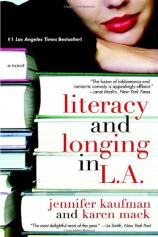Reading Group Guide
Discussion Questions
Literacy and Longing in L.A.

1. Dora’s passion for literature infuses everything she does. How has literature played a role in your life? Have books ever carried you through rough times?
2.Longing is only one of the universal themes/issues that the book explores. Others include abandonment, social acceptance and escape. Discuss how these themes are woven into the book.
3. Dora often refers to classics from her childhood like The Wind in the Willows and A Wrinkle in Time. What book from your childhood still resonates with you? Have you ever re-read it? Do you ever reread the books you love?
4. In what ways does Dora connect with some of her favorite authors: i.e., Eudora Welty, Mark Twain, Carson McCullers, Dorothy Parker, Edith Wharton. Others?
5. Certain passages in Literacy and Longing pay homage to classic and popular authors in subtle, almost code-like fashion. How many “codes” can you find and who are the authors?
6. How do Dora and her sister Virginia personify different reactions to their dysfunctional upbringing? How is “family” depicted? Sometimes we are asked to make sacrifices to help family members. How far would you go to help your relatives, and just how much do we owe the people we love?
7. Comment on L A as a character in the book? Would this novel feel the same if it were set in the Midwest? Manhattan? How do the specific locales enliven the story for readers in and outside of L A?
8. How does meeting Bea change Dora? If you had to name an author who created your mother, who would it be? Wilde? Austen? James? Welty? Or, God forbid, Dickens?
9. Have you ever fallen for the bad boy? What else does Fred offer Dora other than sexy, romantic interludes and poetic discourse? Why would a woman need or want anything more?
10. How does Dora deal with her mother's alcholism and the absence of her father? Does she ever really forgive her mother?
11. Does the character of Darlene serve merely as comic relief? Other than the Shakespearean fool, does she symbolize anything else?
12. How would this story change if it were told in the third person? Would it even work? How much of Dora’s inner voice accounts for reality?
13. Is the book a satire, drama or romantic comedy?
14. How satisfying is the ending? At the end of the novel, is Dora finally content?
Literacy and Longing in L.A.
- Publication Date: May 29, 2007
- Paperback: 352 pages
- Publisher: Delta
- ISBN-10: 0385340184
- ISBN-13: 9780385340182







